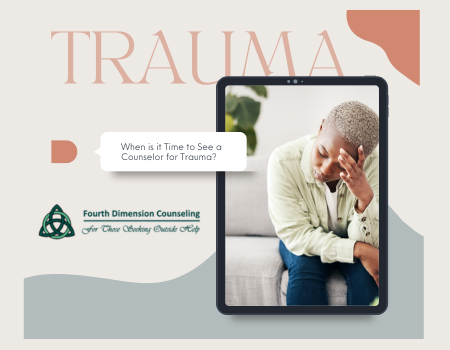Trauma. It’s a heavy word, carrying the weight of experiences that leave lasting emotional and psychological scars. While some traumas are readily apparent, like a car accident or a violent assault, others can be more subtle, their effects creeping into daily life. If you’re struggling with the aftermath of a traumatic event, you might be wondering – is it time to see a counselor?
Understanding Trauma: Beyond the Obvious
 Trauma is a response to a deeply disturbing or distressing event that overwhelms a person’s ability to cope. This can include experiences like:
Trauma is a response to a deeply disturbing or distressing event that overwhelms a person’s ability to cope. This can include experiences like:
- Physical or sexual assault
- Witnessing violence
- Accidents or natural disasters
- Sudden loss of a loved one
- Serious illness
- Childhood abuse or neglect
However, trauma can also stem from seemingly less dramatic events, such as:
- Bullying
- Chronic neglect
- Emotional abuse
- Repeated exposure to stressful situations
The key factor is the impact the event has on the individual. If the memory of the event continues to cause distress and interferes with daily functioning, it might be considered a traumatic experience.
Signs You Might Need a Trauma Counselor
The decision to seek professional help can be daunting, but recognizing the following signs can be a good starting point:
- Intrusive Thoughts and Flashbacks: Do you experience vivid and unwanted memories of the traumatic event? These can be flashbacks that transport you back to the moment of the trauma, or intrusive thoughts that replay the event over and over again.
- Nightmares: Are you plagued by disturbing dreams related to the trauma? These nightmares can disrupt your sleep and leave you feeling exhausted and on edge.
- Avoidance: Do you find yourself avoiding places, people, or situations that remind you of the trauma? This may be an unconscious attempt to protect yourself, but it can also limit your life experiences.
- Emotional Numbness: Are you experiencing feelings of detachment or emotional numbness? This can be a coping mechanism, but it can also make it difficult to connect with others and experience joy.
- Hypervigilance: Are you constantly on edge, scanning your environment for potential threats? This hypervigilance can be exhausting and lead to anxiety.
- Difficulty Concentrating: Does the trauma make it hard to focus on tasks or complete daily activities? You may notice that you become easily distracted and forgetful.
- Changes in Mood and Behavior: Have you noticed a change in your mood since the trauma? You might experience increased irritability, anger, sadness, or depression. Additionally, you might engage in unhealthy behaviors like substance abuse or self-harm.
- Physical Symptoms: Trauma can manifest in physical ways as well. You might experience headaches, stomachaches, fatigue, or difficulty sleeping. These physical symptoms can be a sign that your body is still in a state of fight-or-flight.
The Benefits of Therapy
If you recognize yourself in any of these signs, don’t hesitate to reach out for help. A trauma counselor offers a safe and supportive environment to help you process your experiences. Here are some of the benefits trauma therapy can offer:
- Understanding Your Triggers: Trauma therapy can help you identify the triggers that evoke memories or emotional responses related to the event. This awareness allows you to develop coping mechanisms to manage these triggers effectively.
- Developing Coping Skills: Trauma can leave you feeling helpless. A therapist can teach you various coping skills, such as relaxation techniques, mindfulness practices, and emotional regulation strategies, to manage difficult emotions and cope with challenges in a healthy way.
- Processing the Trauma: Trauma therapy can provide a safe space to talk about your experience and begin to process the emotional impact of the event. This can be a cathartic experience and help you move towards healing.
- Building Resilience: Trauma can leave you feeling fragile and vulnerable. Therapy can help you rebuild your sense of self-worth and empower you to face challenges with greater resilience.
- Improving Relationships: Trauma can damage relationships. With therapy, you can build healthier connections and improve on your communication with loved ones.
Finding the Right Counselor
Seeking help is a courageous step. Here are some tips for finding the right trauma counselor:
- Seek a therapist with experience in trauma therapy. There are different therapy modalities, and some therapists specialize in treating trauma.
- Look for a therapist who uses evidence-based practices. These practices have been shown to be effective in treating trauma.
- Consider factors like your gender, cultural background, and communication style. Feeling comfortable and understood by your therapist is an important part of therapy. Look for someone whose approach aligns with your preferences.
- Schedule an initial consultation. It is important to meet the therapist, because it allows you ask questions, to know if the therapist is a good fit and in the best position to help you.
- Don’t be afraid to try a different therapist if the first one isn’t a good match. Finding and meeting the right therapist is also important for successful therapy.
Trauma can be a life-altering experience, but it doesn’t have to define who you are. With professional help and a commitment to healing, you can move forward and reclaim your life. It’s important to note that therapy is not a sign of weakness but a sign of strength. When you take that first step and seek help, you’re taking control of your well-being and choosing to heal. You can reach out to Fourth Dimension Counseling for help.
